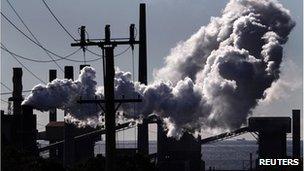Australia Senate backs carbon tax
- Published

Australia is the developed world's worst polluter per head of population
Australia's Senate has approved a controversial law on pollution, after years of bitter political wrangling.
The Clean Energy Act will force the country's 500 worst-polluting companies to pay a tax on their carbon emissions from 1 July next year.
The Senate vote is a victory for Prime Minister Julia Gillard, who had given strong backing to the plan.
Environmentalists have broadly backed the scheme, but there have been large public protests against it.
Opposition parties have argued that the tax would cause job losses and raise the cost of living, and they have promised to repeal the legislation if they win the next election, due in 2013.
'Victory for optimists'
The bill passed a vote in the lower house last month by just 74 votes to 72.
The Senate vote was also tight - 36 votes in favour, 32 against - with the government relying on the support of the Greens to get the bill passed.
Ms Gillard told a news conference it was "a win for those who would seek their fortunes and make their way by having jobs in our clean energy sector".
"Today we have made history. After all those years of debate and division, our nation has got the job done," she said.
The government has set the initial price per tonne of carbon at A$23 ($23.80; £14.80), much higher than other similar schemes such as in the EU where the price is between $8.70 and $12.60 a tonne.
The country's mining firms, airlines, steel makers and energy firms are among those expected to be hardest hit by the tax.
Domestic fuel bills are expected to rise as companies pass on the costs to consumers.
But the government hopes that the legislation will force innovation in renewable energy supplies, and free Australia from its reliance on fossil fuels.
The country accounts for 1.5% of the world's emissions, but it is the developed world's highest emitter per head of population thanks to its relatively small population.
The country's politicians have been debating pollution-limiting legislation for years.
Former Prime Minister Kevin Rudd swept to power in 2007 after making the carbon tax central to his election campaign.
But his plans were bogged down in political infighting and public support evaporated.
Analysts have blamed his inability to get the law passed for his eventual ousting by Ms Gillard.
- Published17 August 2011
- Published11 July 2011
- Published30 May 2011